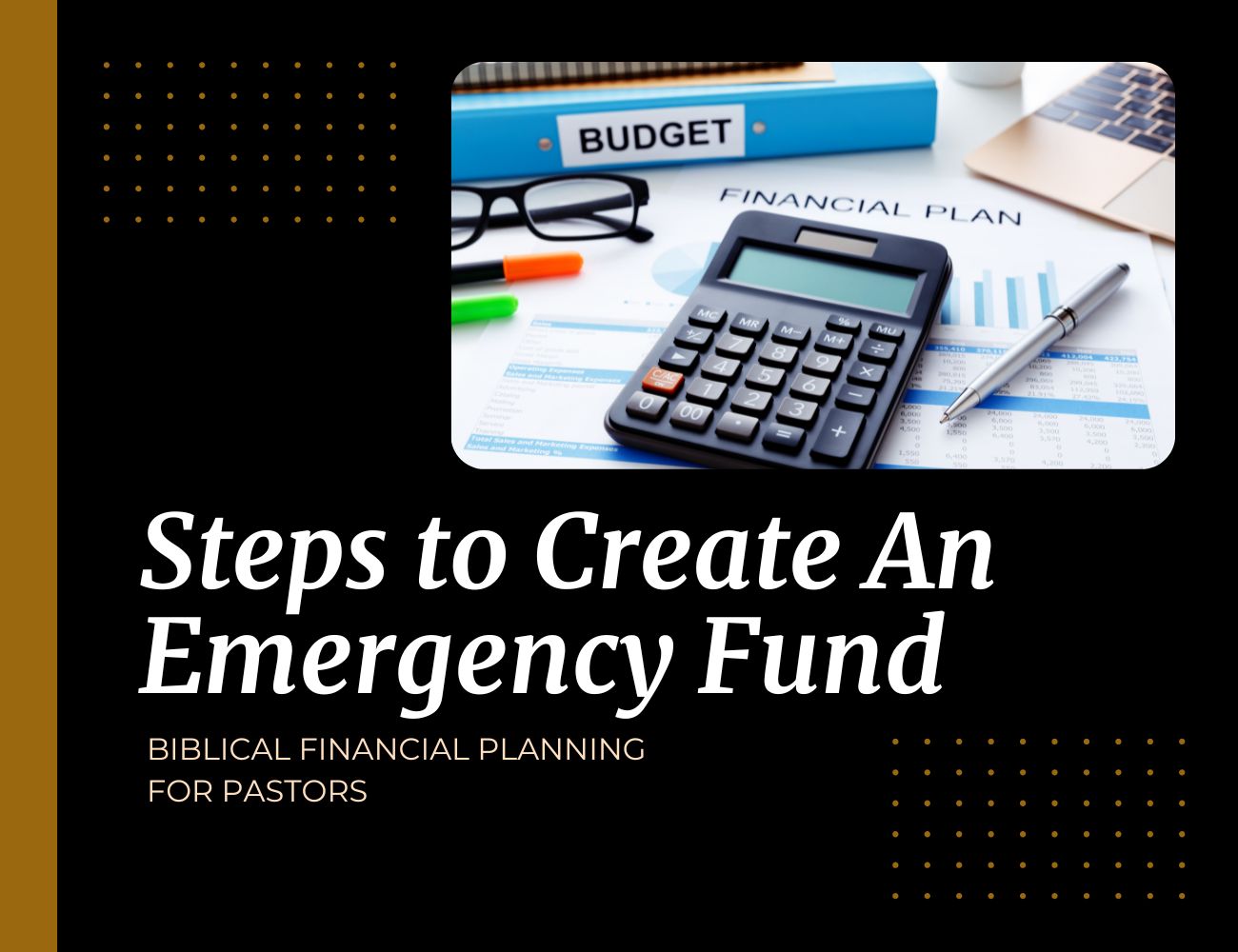Emergency Fund Creation for Pastors
Life in ministry brings unique financial challenges. An emergency fund is money set aside specifically for unexpected expenses or income gaps. Think of it as a financial safety net that gives you peace of mind while you focus on serving your congregation.
As a pastor, your role comes with specific financial considerations. Your income might change based on church attendance, special offerings, or seasonal giving patterns. Plus, you often face expenses that other professionals don’t, like ministry materials or hosting church events in your home.
The Bible offers wisdom about financial preparation. Proverbs 21:20 tells us, “The wise store up choice food and olive oil, but fools gulp theirs down.” This principle of saving for the future while trusting God’s provision creates a strong foundation for ministry life.Creating an emergency fund isn’t about lacking faith—it’s about being a good steward of the resources God provides. When you have savings set aside, you can respond to challenges with confidence and continue your ministry without unnecessary stress.
Why Pastors Need Emergency Funds
Pastors face unique financial challenges that make emergency funds essential. Ministry income often varies throughout the year, especially in smaller churches where giving patterns fluctuate with attendance and seasons. This uncertainty can make regular bill payments and family expenses difficult to manage without savings.
Personal emergencies don’t wait for convenient timing. A broken-down car, unexpected medical bills, or home repairs can create serious financial stress. Studies show that 40% of Americans can’t cover a $400 emergency expense, and pastors are not immune to this reality.
Church budget changes can directly affect a pastor’s income. During economic downturns or membership shifts, churches may need to adjust staff salaries or benefits. An emergency fund provides stability during these challenging periods and allows pastors to continue their ministry without immediate financial pressure.
Family needs add another layer of importance. Pastors often support spouses and children on a single income. From braces to college expenses, having savings helps meet family obligations while maintaining focus on ministry work.
Ministry interruptions can happen suddenly. Health issues, family emergencies, or church transitions may require time away from the pulpit. An emergency fund ensures pastors can take necessary breaks without worrying about basic living expenses.The role of a pastor requires emotional and spiritual energy. Financial stress can drain this energy and impact ministry effectiveness. A solid emergency fund provides peace of mind and allows pastors to serve their congregations with full attention and care.
Setting Your Emergency Fund Goal
Start by calculating your essential monthly expenses. Add up your housing costs, utilities, food, insurance, transportation, and debt payments. For most pastors, this ranges from $3,000 to $5,000 per month.Multiply your monthly expenses by three to set your initial emergency fund goal. For example, if your expenses are $4,000 monthly, aim for $12,000 in savings. This gives you a three-month cushion for unexpected events.
Essential Expenses to Include:
- Housing (rent/mortgage)
- Utilities
- Food and groceries
- Insurance premiums
- Transportation costs
- Medical expenses
- Debt payments
- Phone and internet
- Basic clothing needs
Consider Saving More if You:
- Have an irregular income
- Are the sole provider for your family
- Live in an area with high living costs
- Have ongoing health concerns
- Serve in a small congregation
Start with saving $100 per month if that’s all you can manage. Small steps matter. As your income grows, increase your monthly savings. Remember, building an emergency fund is a marathon, not a sprint.
Set Clear Milestones:
- $1,000 saved
- One month of expenses covered
- Three months of expenses covered
Celebrate each milestone as you reach it. This helps maintain motivation while working toward your final goal.
Practical Steps to Build Your Fund
- Start your emergency fund journey with a clear monthly budget. Write down every dollar you earn and spend. Include your salary, housing allowance, and any other income sources. Then list your monthly expenses like utilities, groceries, and transportation.
- Simple Steps to Start Saving:
- Save $25 from each paycheck
- Cancel one unused subscription
- Pack lunch three days a week
- Use cash for discretionary spending
- Shop with a grocery list
- Set up automatic transfers to your savings account each month. Even $50 or $100 adds up over time. Choose a day right after you receive your paycheck to ensure the money moves before you spend it.
Biblical Foundation for Financial Planning
- The Bible offers clear wisdom about managing money and preparing for the future.
- Proverbs 21:20 – “The wise store up choice food and olive oil, but fools gulp theirs down.”
- Genesis 41 – Joseph saved grain during years of plenty to prepare for famine.
- 1 Timothy 5:8 – “Anyone who does not provide for their relatives… has denied the faith.”
- Proverbs 6:6-8 – The ant stores provisions in summer and gathers food at harvest.
- Proverbs 22:7 – “The rich rule over the poor, and the borrower is slave to the lender.”
- An emergency fund helps pastors avoid debt and plan responsibly, allowing them to focus on ministry without financial stress.
Next Steps
- Start building your emergency fund today with these clear action steps:
- Calculate your monthly expenses. Write down everything you spend on housing, food, utilities, and other basic needs.
- Open a separate savings account specifically for your emergency fund. Look for an account with no fees and easy access to your money.
- Set up automatic transfers from your checking account to your emergency fund. Even $50 per month will help you build savings over time.
- Talk with your spouse about your savings goals. Work together to identify areas where you can reduce spending to save more.
- Schedule a meeting with your church leadership to review your compensation package and discuss financial planning resources.
Need Help Getting Started?
- Contact your denomination’s benefits board
- Join a pastor support group in your area
- Connect with a financial advisor who understands ministry
- Use free budgeting apps like Mint or EveryDollar
Conclusion
Building an emergency fund is a vital step in creating financial stability for your ministry and family. Remember, this fund isn’t just about money—it’s about having peace of mind to focus on your calling without constant financial worry.
Start where you are today. Even setting aside $50 a month will grow into meaningful savings over time. The key is to begin and stay consistent.
Want regular tips and encouragement? Sign up for our free Bridges Newsletter to receive practical financial advice and resources specifically for pastors every month.Take the first step today. Even a small start builds momentum toward financial peace of mind.



